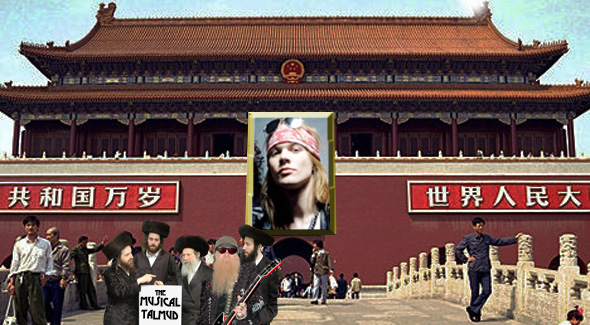Now, we start to move closer to the possible end of Chinese authoritarianism:
4.
‘Cause it would take a lot more hate than you
To end the fascination
Even with an iron fist
All they got to rule the nation
When all I’ve got is precious time
“End the fascination” refers to Western infatuation/enchantment with China, which requires more hate than you (the West) apparently has for China right now. It seems strange that Axl is encouraging us to “hate” China more. Politically charged songs such as this typically refer to “hate” as something to be avoided (e.g. “hate crimes”), but if Axl is trying to shock the West out of its complacency, then one way to do it is by turning inflammatory language on its head.
The authoritarian rule of the CCP is clearly the “iron fist” that Axl refers to, but notice that the “iron fist” is “all they got,” as if it’s somehow insufficient. Axl, however, has “precious time,” meaning that the CCP can try to keep China down with its iron fist, but the forces pushing for freedom in China will eventually prevail. Time/history is on their side (as Axl surely felt was the case with the 14 year long production of the album).
5.
It don’t really matter
Guess I’ll keep it to myself
Said it don’t really matter
It’s time I look around for somebody else
Axl restates the first verse, but with a twist: he’s keeping “it”–presumably, his theories on the moral propriety of engaging China–to himself. He’s finished with trying to convince the Western establishment that its infatuation with China is morally wrong, so now he’s looking for “somebody else” to share it with (this comes back in verse 7, below).
6.
‘Cause it would take a lot more time than you
Have got for masturbation
Even with your iron fist
All they got to rule the nation
When all we got is precious time
All they got to fool the nation
When all I got is precious time
Remember, I said pronouns are important: the “you,” as we found out earlier, refers to the West. Here, Axl focuses his criticism on Western society and its need for instant gratification and self-pleasure. All they have time for is masturbation; it would take more time (and effort) to take the moral high ground (and actually get laid?). Axl goes even further and says that the West also employs “your iron fist”; it’s all “they”–both China AND Western nations–have to rule (and fool) their respective nations. On the other hand, “we” (people in western countries as well as the Chinese) have “precious time,” but it’s “all we got.” Without other tools available to fight the twin iron fists of Western capitalism and Chinese authoritarianism, we’ll have to wait for true justice and democracy.
7.
It don’t really matter
I guess you’ll find out for yourself
No it don’t really matter
So you can hear it now from somebody else
Axl is again admonishing the West for its acceptance of China. They’ll find out the truth both for themselves, but also “from somebody else”–the same “somebody else” that Axl referred to in the fifth verse. Who is this unnamed “third party?” Let’s come back to this. We’re almost to the end of this song.
8.
You think you got it all locked up inside
And if you beat ’em enough they’ll die
It’s like a walk in the park from a cell
And now you’re keeping your own kind in hell
When your great wall rocks blame yourself
While their arms reach up for your help
And you’re out of time
Axl is now directly tying the West to Chinese human rights abuses, such as the imprisonment of political dissidents. As for the “Great Wall,” one might at first assume that this refers to the actual Great Wall of China, but as we’ve seen, Axl is trying to tie China’s power and its abuses to those of the West. With the pronoun “you,” Axl is actually referring to another “great wall,” in this case, the now-commonly accepted idea that the West should cooperate with China rather than confront it and its human rights abuses. When the “great wall rocks”–when this myth begins to crumble–the West will only have itself to blame. Coming to the finish line, Axl throws in for good measure the unmistakable imagery of political prisoners’ arms reaching up in vain for help from the free world.

We can has democracy plz?
Finally, Western nations and the CCP are “out of time”; their power has collapsed. Democracy and justice have arrived…but how? Remember that “somebody else” that Axl vaguely referred to in verses 5 and 7? This is clearly the agent that has finally brought about this revolution, but Axl provides scant evidence to its identity. Is it a worldwide grassroots movement of human rights advocates? A violent revolution of the proletariat? The Second Coming Of Christ? Your guess is as good as mine–show me in the comments if you’ve made it to the end!
Conclusion: Axl has taken us on a tour de force of international relations. “Chinese Democracy” is a powerful statement against a policy of engagement with China that doesn’t confront its human rights abuses. Axl, however, holds little faith in the resolve of Western powers; instead, he takes the long view on history and is counting on a new power base to rise to confront the establishment.


If I’m correct in my assumption about where that last image comes from, I think the next shot of it (at the end of this clip: http://vids.myspace.com/index.cfm?fuseaction=vids.individual&VideoID=31139118 )to an extent, encapsulates whom *I* think Axl is referring to: the Chinese people themselves. Similar to how Marxist revolutionary theory rests a lot upon the power of the numbers of the proletariat, there are a LOT more poor and oppressed people in China than there are affluent and prosperous. In time, Axl postulates, they will realize the power they have AS A GROUP and collectively give the CCP the birdy.
I think he’s relying more on the Chinese people than the rest of the world because of this “time” issue. “Time” doesn’t really mean anything to those outside of China and not suffering under its government because those on the outside are getting exactly what they want: cheap(ly made) goods and cheap labor. Yes, there are probably a lot more people upset by the human rights violations than aren’t, but it would take more than just time to get THEM to do something about it in the massive amounts and direct methods required to tip the scale, for when in history has a movement and intervention from the outside started a successful revolution from within because of issues like this one? And I wouldn’t count, say, the French Revolution because yes, while inspired by the American one, we didn’t physically assist the French revolutionaries- I’m talking about DIRECT intervention, not just inspirational or philosophical. Overall, “It’s not my problem,” is the mindset when it’s not happening on the inside, so unless it *becomes* “my problem,” meaning we find out that Americans are getting mistreated in China in droves (because there are probably examples that get written off as “isolated incidents,” I’m sure), it’s going to come from China, not anywhere else.
IMO, of course.
Awesome post. Coincidentally, I was listening to The Shins as I was writing my comment, and “So Says I” started to play. It’s great commentary on the failure of Communist revolutions. And the video is made of awesome:
http://www.sing365.com/music/lyric.nsf/So-Says-I-lyrics-The-Shins/B99869908A19A2CB48256DDF000B99E5
Oh, here’s the video…
http://www.youtube.com/watch?v=K-P15e6NvtU
I fear that a majority of the American public would rule in favor of not disrupting the enormous economic cooperation between the two nations no matter what nationality of people are being persecuted. At the very least the government would be in pickle with a recession in full swing. Overall, the analysis of these lyrics were fun to read and very smart. I however have not heard anyone mention G N R finally releasing the album in “Beijing 2008.” Can anyone point me to some good analysis of that?
The people will be the factor in giving the CCP the finger but it remains to be seen if China’s relations with neighboring nations could have a part in that (i.e. India and Tibet). Those western provinces will be key with how they treated and structured.